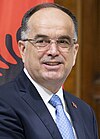Albania is a unitary parliamentary constitutional republic, in which the president of Albania is the head of state and the prime minister of Albania is the head of government in a multi-party system. The executive power is exercised by the Government and the prime minister with its Cabinet. Legislative power is vested in the Parliament of Albania. The judiciary is independent of the executive and the legislature. The political system of Albania is laid out in the 1998 constitution. The Parliament adopted the current constitution on 28 November 1998. Historically Albania has had many constitutions. Initially constituted as a monarchy in 1913, Albania became briefly a republic in 1925, and then a authoritarian monarchy in 1928. In 1939 Albania was invaded by Fascist Italian forces, imposing a puppet state, and later occupied by Nazi German forces. Following the partisan liberation from the Nazis in 1944 a provisional government was formed, which by 1946 had transformed into a communist one-party state. In March 1991 democracy was restored with multi-party elections.

The flag of Albania depicts a silhouetted black double-headed eagle in the center of a red background. The red stands for bravery, strength, valour and bloodshed, while the Eagle represents the sovereign state of Albania. The flag was established as the national flag of Albania when the country gained its independence from the Ottoman Empire in 1912.

Ramiz Alia was an Albanian politician serving as the second and last leader of the People's Socialist Republic of Albania from 1985 to 1991, serving as First Secretary of the Party of Labour of Albania. He was also the country's head of state from 1982 to 1992. He had been seen as a successor by Enver Hoxha and took power after Hoxha died.

Sali Ram Berisha is an Albanian cardiologist and conservative politician who served as the president of Albania from 1992 to 1997 and 32nd prime minister from 2005 to 2013. Berisha serves as Chairman of the Democratic Party of Albania since 2022 and has held the position previously from 1990 to 2013. He also serves as the incumbent Leader of Opposition in the Albanian parliament.
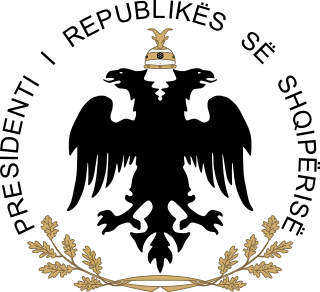
The president of Albania, officially styled the President of the Republic of Albania, is the head of state, commander-in-chief of the military and the representative of the unity of the Albanian people.

Edi Rama is an Albanian politician, painter, writer, former university lecturer, publicist and former basketball player, who has served as the 33rd and incumbent Prime Minister of Albania since 2013 and chairman of the Socialist Party of Albania since 2005. He was appointed Minister of Culture, Youth and Sports in 1998, an office he held until 2000. First elected mayor of Tirana in 2000, he was reelected in 2003 and 2007.
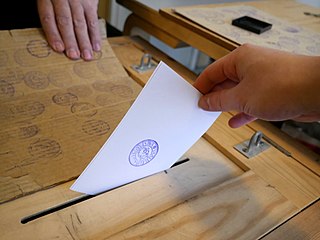
A presidential election is the election of any head of state whose official title is President.
The politics of Kosovo takes place in a framework of a multi-party parliamentary representative democratic republic, whereby the President (Presidenti) is the head of state and the Prime Minister (Kryeministri) the head of government. Parliamentary elections are held every four years, the most recent in 2021.

The prime minister of North Macedonia, officially the President of the Government of the Republic of North Macedonia, is the head of government of North Macedonia.
The present Constitution of the Republic of Albania was adopted by the Parliament of Albania on 21 October 1998 and certified by presidential decree on 28 November 1998, following a public referendum which approved the new Constitution. It is split up over many different acts. The document succeeded the 1976 Constitution, originally adopted at the creation of the People's Socialist Republic of Albania on 28 December 1976 and heavily amended on 29 April 1991.

The Albanian Republic was the official name of Albania as enshrined in the Constitution of 1925. Albania came into an alliance with the Kingdom of Italy after signing the Treaties of Tirana, which gave Italy a monopoly on shipping and trade concessions. Albania was declared a constitutional monarchy in 1928. Upon its inception, Italy demanded to be allies with the republic. This was done largely to increase Italy's influence in the Balkans, and to aid Italian and Albanian security in their territorial feuds with the Second Hellenic Republic and the Kingdom of Serbs, Croats, and Slovenes.

The Autonomous Province of Kosovo and Metohija, commonly known as Kosovo and abbreviated to Kosmet or KiM, is an autonomous province defined by the Constitution of Serbia that occupies the southernmost part of Serbia. The territory is the subject of an ongoing political and territorial dispute between Republic of Serbia and the partially recognised Republic of Kosovo. Its claimed administrative capital and largest city is Pristina.

The following outline is provided as an overview of and topical guide to Albania:

The fall of communism in Albania, the last such event in Europe outside the Soviet Union, started in December 1990 with student demonstrations in the capital, Tirana, although protests started in January that year in other cities like Shkodra and Kavaja. The Central Committee of the communist Party of Labour of Albania allowed political pluralism on 11 December and the largest opposition party, the Democratic Party, was founded the next day. March 1991 elections left the Party of Labour in power, but a general strike and urban opposition led to the formation of a "stability government" that included non-communists. Albania's former communists were routed in elections in March 1992 amid economic collapse and social unrest, with the Democratic Party winning most seats and its party head, Sali Berisha, becoming president.
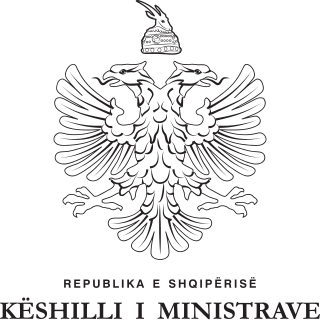
The Council of Ministers is the executive branch that constitutes the Government of Albania. The Council is led by the Prime Minister of Albania. The prime minister is nominated by the President from among those candidates, who enjoy majority support in the Parliament; the candidate is then chosen by the Parliament. In the absence of the prime minister, the Deputy Prime Minister takes over his functions. There are 19 other government members, serving as deputy prime ministers, government ministers or both; they are chosen by the prime minister and confirmed by the Parliament.

The Ministry of Defence is a department of the Albanian Government, in charge of the formation and implementation of national security and ordering, coordinating and carrying out the general guidelines of the Cabinet about the defence policy, and is the headquarters of the Military of Albania. It is Albania's ministry of defence.
Indirect presidential elections were held in Albania on 30 May, 4, 8 and 11 June 2012, the seventh such elections since the collapse of the communist regime in 1991. The first through third rounds of voting were inconclusive. The fourth round resulted in the incumbent party's member Bujar Nishani being elected as President.

Albania and Palestine established diplomatic relations in 1990. Albania had already recognized Palestine as a state since 1988. Palestine has an embassy in Tirana, but Albania does not have an embassy in Palestine. Both are member of the Organisation of Islamic Cooperation.
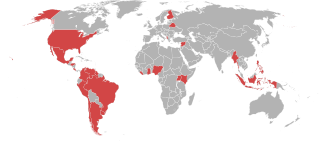
A natural-born-citizen clause is a provision in some constitutions that certain officers, usually the head of state, must be "natural-born" citizens of that state, but there is no universally accepted meaning for the term natural-born. The constitutions of a number of countries contain such a clause but may define or interpret the term natural-born citizen differently. Many countries specify citizenship since birth as a requirement to hold certain offices. This is often described using the natural born phraseology and sometimes further qualified as requiring physical birth within the country's territory and/or requiring that one or both natural parents be a citizen of the country at the time of birth.


























